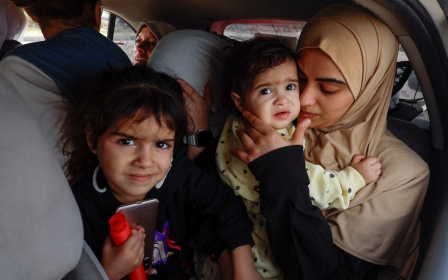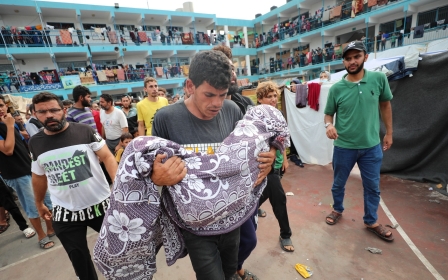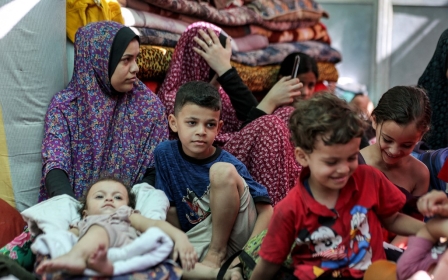Israel-Palestine war: UN says women and newborns bear brunt of Israeli assault on Gaza

Women, children and newborns are disproportionately impacted by the ongoing Israeli onslaught on Gaza, four UN agencies, including the United Nation's International Children’s Emergency Fund (Unicef) and the United Nations Relief and Work Agency (Unrwa), said in a statement on 3 November.
According to Gaza's Ministry of Health, as of early November, 2,326 women and 3,760 children have been killed in the besieged region, representing 67 percent of Palestinian casualties since the Israeli assault of the Strip began on 7 October.
Since the statement's publication, the number of children killed has risen to 4,104.
With relentless aerial bombardment and the Israeli siege impacting vital access to water, electricity, food, fuel and medicine, 16 of 35 hospitals have been forced to close.
Many of the remaining are on the verge of a blackout.
New MEE newsletter: Jerusalem Dispatch
Sign up to get the latest insights and analysis on Israel-Palestine, alongside Turkey Unpacked and other MEE newsletters
With access to vital services severely curtailed, some women are left with little option but to give birth in shelters, in their homes, in the streets or in overwhelmed and increasingly unsanitary healthcare facilities, which have also become military targets.
Follow Middle East Eye's live coverage for the latest on the Israel-Palestine war
On 1 November , Al Hilo Hospital, a key maternity hospital that had absorbed and replaced Shifa hospital’s maternity ward, was reportedly struck by shelling.
The UN statement also notes the psychological toll of the Israeli onslaught, which has produced a rise in stress induced miscarriages, still-births and premature births.
Risks associated with birth
Dwindling supplies of food have exacerbated rates of malnutrition among pregnant women in Gaza that were prevalent prior to the war.
With an estimated 50,000 pregnant women in Gaza, and 15 percent of them likely to experience pregnancy or birth-related complications, maternal deaths are likely to surge.
Shortage of medical supplies means childbirth procedures, including C-sections, are being performed without anaesthesia.
An estimated 4,600 displaced women and 380 newborns sheltering in Unrwa facilities require medical attention, with rapidly deteriorating conditions putting them at risk of malnutrition, dehydration and water-borne diseases.
Israel’s total blockade on Gaza is also putting newborns at grave risk. With fuel supplies running low, neo-natal units are struggling to power life-saving incubators, which an estimated 130 babies are dependent on.
“Humanitarian agencies urgently need sustained and safe access to bring more medicines, food, water and fuel into Gaza,” the UN agencies said in the statement, further calling for an “immediate humanitarian pause… to alleviate the suffering and prevent a desperate situation from becoming catastrophic.”
Middle East Eye delivers independent and unrivalled coverage and analysis of the Middle East, North Africa and beyond. To learn more about republishing this content and the associated fees, please fill out this form. More about MEE can be found here.




